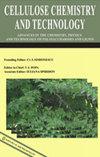EFFECT OF CELLULOSE NANOFIBERS FROM RED COCONUT PEDUNCLE WASTE AS REINFORCEMENT IN EPOXY COMPOSITE SHEETS
IF 1.1
4区 农林科学
Q2 MATERIALS SCIENCE, PAPER & WOOD
Cellulose Chemistry and Technology
Pub Date : 2023-09-29
DOI:10.35812/cellulosechemtechnol.2023.57.75
引用次数: 0
Abstract
Organic filler-reinforced thermosetting polymer composites, when contrasted with ferrous, nonferrous, and their respective alloys, offer a broad spectrum of applications. Extensive research has been dedicated to enhancing the intrinsic mechanical and thermal properties of composite materials, with a particular focus on environmentally friendly, recyclable, and biodegradable reinforcements. As a result, the present study involved the preparation of composites by amalgamating cellulose nanofibers (CNFs) sourced from agricultural waste with epoxy to augment the characteristics of polymer composites. The CNFs-reinforced epoxy composites were fabricated via the compression molding process, incorporating filler loadings ranging from 1% to 3% by weight. A comprehensive experimental investigation was conducted on the mechanical properties (tensile, flexural, impact, and hardness) and thermal properties (heat deflection temperature) of these composites. Additionally, scanning electron microscopy was employed to examine the surface characteristics and fractured surfaces of the composites. The results revealed that, among the produced composites, those containing 2 wt% CNFs in the epoxy exhibited superior mechanical properties, outstanding tensile and flexural strengths of 42.8 ± 2 MPa and 106.1 ± 1.6 MPa, respectively, along with an impact strength of 13 ± 2.5 KJ/m² and a hardness rating of 21.2. Notably, these 2 wt% CNFs-reinforced epoxy composites exhibited a 7% increase in the heat deflection temperature, compared to the pristine epoxy resin.红椰梗废纤维素纳米纤维在环氧复合材料中的增强作用
有机填料增强热固性聚合物复合材料与黑色金属、有色金属及其各自的合金相比,具有广泛的应用范围。广泛的研究致力于提高复合材料的内在机械和热性能,特别关注环保,可回收和可生物降解的增强材料。因此,本研究涉及通过将来自农业废弃物的纤维素纳米纤维(CNFs)与环氧树脂混合来制备复合材料,以增强聚合物复合材料的特性。cnfs增强环氧复合材料是通过压缩成型工艺制造的,其中填料的重量从1%到3%不等。对复合材料的力学性能(拉伸、弯曲、冲击、硬度)和热性能(热挠曲温度)进行了全面的实验研究。此外,采用扫描电子显微镜对复合材料的表面特征和断裂表面进行了观察。结果表明,环氧树脂中CNFs含量为2 wt%的复合材料具有优异的力学性能,拉伸强度为42.8±2 MPa,弯曲强度为106.1±1.6 MPa,冲击强度为13±2.5 KJ/m²,硬度等级为21.2。值得注意的是,与原始环氧树脂相比,这些2 wt% cnfs增强环氧复合材料的热变形温度提高了7%。
本文章由计算机程序翻译,如有差异,请以英文原文为准。
求助全文
约1分钟内获得全文
求助全文
来源期刊

Cellulose Chemistry and Technology
工程技术-材料科学:纸与木材
CiteScore
2.30
自引率
23.10%
发文量
81
审稿时长
7.3 months
期刊介绍:
Cellulose Chemistry and Technology covers the study and exploitation of the industrial applications of carbohydrate polymers in areas such as food, textiles, paper, wood, adhesives, pharmaceuticals, oil field applications and industrial chemistry.
Topics include:
• studies of structure and properties
• biological and industrial development
• analytical methods
• chemical and microbiological modifications
• interactions with other materials
 求助内容:
求助内容: 应助结果提醒方式:
应助结果提醒方式:


